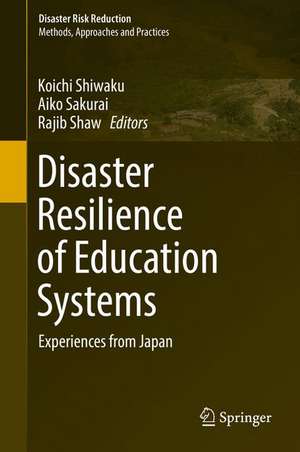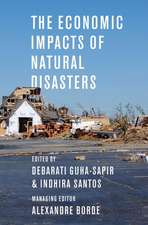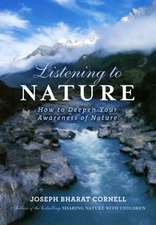Disaster Resilience of Education Systems: Experiences from Japan: Disaster Risk Reduction
Editat de Koichi Shiwaku, Aiko Sakurai, Rajib Shawen Limba Engleză Hardback – 13 iun 2016
This book reviews the evolution of DRR in the education sector in Japan, including some of the recent developments after the 2011 Great East Japan Earthquake, focusing on DRR governance and practices in national policies, curriculum development and teacher training, community linkage, and international cooperation, to enhance resilience in the education sector.
The primary target groups for this book are students and researchers in the fields of disaster management and DRR studies. Another target group comprises practitioners and policy makers, who will be able to apply the collective knowledge from this work to policy and decision making. The book provides an overview of the current research trends and furnishes basic knowledge on this important topic.
| Toate formatele și edițiile | Preț | Express |
|---|---|---|
| Paperback (1) | 503.15 lei 38-44 zile | |
| Springer – 7 iun 2018 | 503.15 lei 38-44 zile | |
| Hardback (1) | 698.99 lei 38-44 zile | |
| Springer – 13 iun 2016 | 698.99 lei 38-44 zile |
Din seria Disaster Risk Reduction
- 18%
 Preț: 796.61 lei
Preț: 796.61 lei -
 Preț: 394.30 lei
Preț: 394.30 lei - 18%
 Preț: 790.46 lei
Preț: 790.46 lei - 15%
 Preț: 654.12 lei
Preț: 654.12 lei - 18%
 Preț: 967.08 lei
Preț: 967.08 lei - 24%
 Preț: 640.27 lei
Preț: 640.27 lei - 18%
 Preț: 1009.16 lei
Preț: 1009.16 lei - 18%
 Preț: 890.54 lei
Preț: 890.54 lei - 18%
 Preț: 942.94 lei
Preț: 942.94 lei - 15%
 Preț: 646.30 lei
Preț: 646.30 lei - 18%
 Preț: 782.24 lei
Preț: 782.24 lei - 18%
 Preț: 898.75 lei
Preț: 898.75 lei - 18%
 Preț: 956.33 lei
Preț: 956.33 lei - 18%
 Preț: 947.50 lei
Preț: 947.50 lei - 15%
 Preț: 643.34 lei
Preț: 643.34 lei - 24%
 Preț: 921.07 lei
Preț: 921.07 lei - 18%
 Preț: 951.91 lei
Preț: 951.91 lei - 18%
 Preț: 894.97 lei
Preț: 894.97 lei - 15%
 Preț: 641.85 lei
Preț: 641.85 lei - 24%
 Preț: 639.86 lei
Preț: 639.86 lei - 18%
 Preț: 790.14 lei
Preț: 790.14 lei - 18%
 Preț: 729.18 lei
Preț: 729.18 lei - 18%
 Preț: 784.13 lei
Preț: 784.13 lei - 18%
 Preț: 783.50 lei
Preț: 783.50 lei - 18%
 Preț: 784.48 lei
Preț: 784.48 lei - 15%
 Preț: 642.18 lei
Preț: 642.18 lei - 15%
 Preț: 651.51 lei
Preț: 651.51 lei - 18%
 Preț: 943.57 lei
Preț: 943.57 lei - 15%
 Preț: 649.54 lei
Preț: 649.54 lei - 24%
 Preț: 690.45 lei
Preț: 690.45 lei - 24%
 Preț: 899.52 lei
Preț: 899.52 lei - 18%
 Preț: 962.27 lei
Preț: 962.27 lei - 15%
 Preț: 652.17 lei
Preț: 652.17 lei - 15%
 Preț: 646.75 lei
Preț: 646.75 lei - 20%
 Preț: 587.28 lei
Preț: 587.28 lei - 15%
 Preț: 647.40 lei
Preț: 647.40 lei - 18%
 Preț: 957.75 lei
Preț: 957.75 lei
Preț: 698.99 lei
Preț vechi: 919.72 lei
-24% Nou
Puncte Express: 1048
Preț estimativ în valută:
133.75€ • 140.02$ • 110.67£
133.75€ • 140.02$ • 110.67£
Carte tipărită la comandă
Livrare economică 01-07 aprilie
Preluare comenzi: 021 569.72.76
Specificații
ISBN-13: 9784431559801
ISBN-10: 4431559809
Pagini: 250
Ilustrații: XI, 241 p. 49 illus., 26 illus. in color.
Dimensiuni: 155 x 235 x 20 mm
Greutate: 0.68 kg
Ediția:1st ed. 2016
Editura: Springer
Colecția Springer
Seria Disaster Risk Reduction
Locul publicării:Tokyo, Japan
ISBN-10: 4431559809
Pagini: 250
Ilustrații: XI, 241 p. 49 illus., 26 illus. in color.
Dimensiuni: 155 x 235 x 20 mm
Greutate: 0.68 kg
Ediția:1st ed. 2016
Editura: Springer
Colecția Springer
Seria Disaster Risk Reduction
Locul publicării:Tokyo, Japan
Public țintă
ResearchCuprins
Introduction.- Governance of the Education Sector and Risk Reduction.- Local Governance and School Disaster Education.- Disaster Prevention Education in the Japanese School Curricula in Recent Years.- Schools, Teachers, and Training in Risk Reduction after the 2011 Tohoku Disaster.- Curriculum of Maiko High School in Kobe.- Community Linkages and Disaster Risk Reduction Education.- School Disaster Resilience Assessment.- Training Project in Higher Education.- International cooperation.- Role of International NGOs in Education Sector Recovery in Japan.- International cooperation.- International cooperation.- Future Perspectives of Disaster Resilience of Education System in Japan and Abroad.
Recenzii
“Contributors from the private sector, government, and the academy come together to offer a comprehensive look at DRR by examining a collection of 14 case studies. … This work is expressly recommended for scholars and academicians in the fields of disaster management and DRR, as it comprehensively addresses current research in this field. Summing Up: Recommended. Graduate students; researchers and faculty.” (D. M. Moss, Choice, Vol. 54 (5), January, 2017)
Notă biografică
Koichi Shiwaku is a researcher in the Graduate School of Global Environmental Studies of Kyoto University, Japan. He has been working with central and local governments, NGOs, school teachers and students, and local communities in Japan and overseas countries. His recent works are enhancing school disaster resilience and capacity development of officers of board of education in the area affected by the 2011 Great East Japan Earthquake. His research interests are disaster education, community based disaster risk management, governance for disaster education, school safety, and capacity development of local government.
Aiko Sakurai is an associate professor in the International Research Institute of Disaster Science (IRIDeS), Tohoku University, Japan. She has worked in international educational development in Yemen and Vietnam and started to be involved in a field of disaster education since the 2011 Great East Japan Earthquake. Her recent work is developing a school-based disaster education model at post-disaster phase in Asian countries. Her research interests include comprehensive school safety, education recovery from disaster, and school-based disaster management and education.
Rajib Shaw was Professor in the Graduate School of Global Environmental Studies of Kyoto University, Japan. He worked closely with the local communities, NGOs, governments and international organization, including United Nations, especially in the Asian countries. He is currently the Co-chair of the United Nations Asia Science Technology Academia Advisory Group (ASTAAG) and the President of Asian University Network of Environment and Disaster Management (AUEDM). His research interests are community-based disaster risk management, climate change adaptation, urban risk management and disaster and environmental education. He has published several books in the field of disaster and environmental management. He is also the Chief Editor of Asian Journal of Environment and Disaster Management.
Aiko Sakurai is an associate professor in the International Research Institute of Disaster Science (IRIDeS), Tohoku University, Japan. She has worked in international educational development in Yemen and Vietnam and started to be involved in a field of disaster education since the 2011 Great East Japan Earthquake. Her recent work is developing a school-based disaster education model at post-disaster phase in Asian countries. Her research interests include comprehensive school safety, education recovery from disaster, and school-based disaster management and education.
Rajib Shaw was Professor in the Graduate School of Global Environmental Studies of Kyoto University, Japan. He worked closely with the local communities, NGOs, governments and international organization, including United Nations, especially in the Asian countries. He is currently the Co-chair of the United Nations Asia Science Technology Academia Advisory Group (ASTAAG) and the President of Asian University Network of Environment and Disaster Management (AUEDM). His research interests are community-based disaster risk management, climate change adaptation, urban risk management and disaster and environmental education. He has published several books in the field of disaster and environmental management. He is also the Chief Editor of Asian Journal of Environment and Disaster Management.
Textul de pe ultima copertă
Education is regarded as a cross-cutting issue for disaster risk reduction (DRR) through reviewing the Sendai Framework for DRR (SFDRR) 2015–2030. Mainstreaming Disaster Risk Reduction (DRR) in the education sector is one of the important efforts to enhance resilience in a community. DRR in the education sector not only focuses on provision of disaster education, but also includes securing a safe school environment, developing school disaster management plans, and building the capacity of school teachers and local educational officers. Japan, with its wealth of experience in DRR, has developed a good resilient system in its education sector, which has been tested and revised through experiences of past disasters.
This book reviews the evolution of DRR in the education sector in Japan, including some of the recent developments after the 2011 Great East Japan Earthquake, focusing on DRR governance and practices in national policies, curriculum development and teacher training, community linkage, and international cooperation, to enhance resilience in the education sector.
The primary target groups for this book are students and researchers in the fields of disaster management and DRR studies. Another target group comprises practitioners and policy makers, who will be able to apply the collective knowledge from this work to policy and decision making. The book provides an overview of the current research trends and furnishes basic knowledge on this important topic.
This book reviews the evolution of DRR in the education sector in Japan, including some of the recent developments after the 2011 Great East Japan Earthquake, focusing on DRR governance and practices in national policies, curriculum development and teacher training, community linkage, and international cooperation, to enhance resilience in the education sector.
The primary target groups for this book are students and researchers in the fields of disaster management and DRR studies. Another target group comprises practitioners and policy makers, who will be able to apply the collective knowledge from this work to policy and decision making. The book provides an overview of the current research trends and furnishes basic knowledge on this important topic.
Caracteristici
Links the education system and governance for disaster risk reduction Provides details of disaster risk reduction governance for education Explains experiences and lessons of research and practices for disaster education in Japan Draws lessons from Japanese perspectives and points out their relevance to other parts of the world Includes supplementary material: sn.pub/extras





